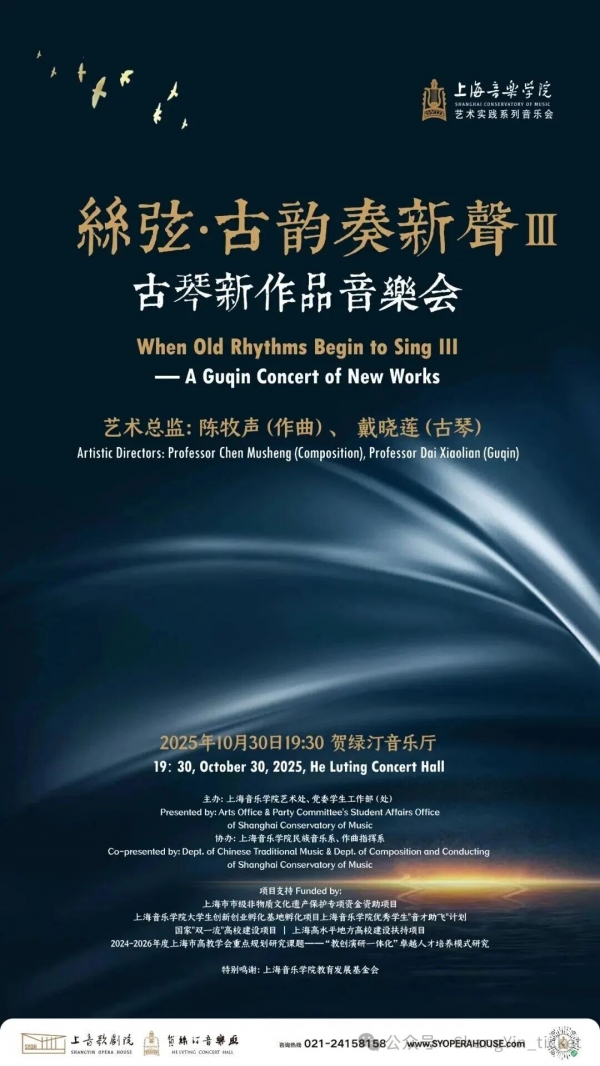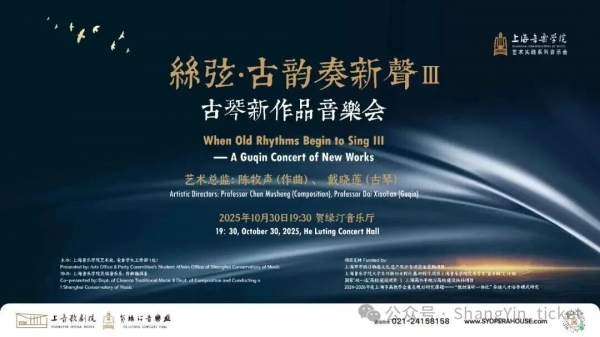节目单
1.《云水禅》 古琴与尺八
"Meditation of Clouds and Streams"——Guqin and Shakuhachi
作曲者:周少聪
Composer: Zhou Shaocong
演奏者:方静宇(古琴)、张明艺(尺八)
Performers: Fang Jingyu(Guqin), Zhang Mingyi(Shakuhachi)
作品名称源自好友彭小峰赠予的墨宝“云水禅心”,我取其“心”寄托于声音之间,化为一抹清寂的禅意。作品尝试以古琴与尺八呈现自由的吟诵,昆曲音高素材在其中流转,如云似水,营造出自由与超我之境的内心风景。
The title draws inspiration from the ink artwork "Clouds, Water, Zen Mind" gifted by friend Peng Xiaofeng. The composer omits the word "mind," embedding it instead within the sound, evoking a sense of serene Zen artistic conception. The piece attempts to present free recitation through the guqin and shakuhachi, with Kunqu opera pitch materials flowing throughout, resembling clouds and water, creating an inner landscape of freedom and transcendence.
2.《书法》 古琴独奏
"Calligraphy"——Guqin Solo
作曲者:Xavier van de Poll夏炜烨(荷兰)
Composer: Xavier van de Poll (Netherlands)
演奏者:曾鼎夫P
erformer: Zeng Dingfu
《书法》一曲(英文名 Calligraphy)为荷兰著名汉学家兼外交官高罗佩(Robert Hans van Gulik,1910-1967)所作墨宝谱就的古琴独奏曲。高氏深谙琴道,其所著《琴道》(1940年,英文版名 The Lore of the Chinese Lute)至今仍被视为经典之作。此曲以“一笔一动作”为创作原则——每一笔墨痕对应古琴的一个演奏动作,或单音,或走手连音,或密集泛音群。具体译谱规则详见后附演奏说明。全曲十四字(7+7句式)恰合百笔之数(42+58笔)。所书“看山爱竹了公事,焚香挂画似神山”二句,深得宋明士大夫“仕隐两全”之旨。“看山爱竹”谓案牍劳形之际不忘林泉之志(山喻智慧,竹比风骨),乃儒道互补之体现;“焚香挂画”则以雅事化书房为洞天(香凝神思,画引卧游),恰似高罗佩生平雅好。
《书法》 (original English title: Calligraphy) is a guqin solo piece based on calligraphy by the renowned Dutch sinologist and diplomat Robert Hans van Gulik (1910--1967). Van Gulik was deeply knowledgeable about the guqin: his book "The Lore of the Chinese Lute" (1940) is still regarded as a classic. The piece follows the principle of "one stroke, one action" -- each brushstroke corresponds to a single action on the guqin, whether a single pitch, a glissando, or a chord. The entire piece consists of 14 characters in a 7+7 structure, matching exactly 100 brushstrokes (42+58). His calligraphy reads: "Appreciating mountains and bamboo, I conclude official duties; burning incense and hanging paintings, it feels like divine mountains." The poem deeply reflects the Song and Ming Dynasty scholar-officials' ideal of "balancing service and reclusion", embodying the complementarity of Confucianism and Daoism. Calligraphy serves as the overture to the opera The Dutch Mandarin, the story of which is set in Chongqing anno 1943. The music reflects the tension between Chinese and Japanese pentatonic modes, ultimately resolving back to its Chinese roots."
3《琴歌二首》 古琴、长笛与男声
"Two Qin Songs"——Guqin, Flute, and Male Voice
作曲者:林圣杰
Composer: Lin Shengjie
演奏者:戴均倍(古琴)、李任轩(声乐)、曹若苓(长笛)
Performers: Dai Junbei (Guqin), Li Renxuan (Vocal), Cao Ruoling (Flute)
此曲选取两首唐代诗作,搭建穿越时空的对话:《登幽州台歌》借陈子昂登高抒怀,以苍茫琴音和化作千古浩叹,道尽天地浩渺与生命孤往;《竹里馆》步入王维辋川别业,清越琴音与低吟相和,绘就月下竹林的静谧诗境。一曲悲怆苍茫,一曲空灵自在,恰似文人精神的两面,在琴音中相映成趣。
This piece selects two Tang dynasty poems to construct a dialogue across time: "On the Gate Tower at Youzhou" by Chen Zi'ang expresses lofty sentiments through vast guqin tones, conveying the boundlessness of heaven and earth and the solitude of life. "The Bamboo Grove Pavilion" enters Wang Wei's Wangchuan Villa, with clear guqin sounds and low chanting painting a tranquil poetic scene of moonlight bamboo. One piece is desolate and vast, the other ethereal and free, reflecting two aspects of literati spirit through the guqin.
《登幽州台歌》唐·陈子昂
"On the Gate Tower at Youzhou" by Chen Zi'ang (Tang Dynasty)
前不见古人,后不见来者。念天地之悠悠,独怆然而涕下!
Where are the great men of the past? Where are those of future years? The sky and earth forever last; Here and now I alone shed tears.
《竹里馆》唐·王维
"The Bamboo Grove Lodge" by Wang Wei (Tang Dynasty)
独坐幽篁里,弹琴复长啸。深林人不知,明月来相照。
Sitting alone in the dark bamboo grove, I play my zither and whistle long. Deep in the woods, unknown to men, Only the bright moon comes to shine.
4.《静瑟·涟漪》 古琴与大提琴
"Stillness · Ripples"——Guqin and Cello
作曲者:孙创
Composer: Sun Chuang
演奏者:张雨轩(古琴)、俞婉婷(大提琴)
Performers: Zhang Yuxuan (Guqin), Yu Wanting (Cello)
一弦清响入晴波,低语深弦引浪歌。静处忽生千点动,心湖月影共婆娑。初寂的水面上,古琴如远山的清风,轻拂心湖,泛起微不可察的波光。大提琴自水底缓缓升起,低沉而深情,仿佛为这片静谧注入了温热的脉搏。两种音色相互倾听、彼此呼应——古琴的空灵与大提琴的醇厚,像光与影交织,在时间的涟漪中缓缓扩散。乐曲在极静与微动之间流转,最终归于无声,似一滴水融入无垠的湖面,只留心间久久回荡的余韵。
A single pure note ripples into the clear waves; deep strings whisper, stirring a song of the tides. In stillness, a thousand subtle motions arise; the moon's reflection dances upon the lake of the heart. On the initially tranquil surface, the guqin is like a distant mountain breeze, gently brushing the lake of the heart and awakening faint, imperceptible glimmers. The cello rises slowly from the depths---low, tender, and profound---as if breathing warmth into the silence.The two timbres listen and respond to one another: the guqin's ethereal clarity and the cello's mellow richness intertwine like light and shadow, slowly expanding through the ripples of time. The music flows between stillness and motion, finally returning to silence---like a single drop merging into the boundless lake, leaving only a lingering resonance within the heart.
5.《明月松间》 古琴与箫
"Moonlight Through Pines"——Guqin and Xiao
作曲者:胡亦皓
Composer: Hu Yihao
演奏者:刘希因(古琴)、刘之欣(箫)
Performers: Liu Xiyin (Guqin), Liu Zhixin (Xiao)
作品旨在以箫与古琴两件中国传统乐器表达王维诗中的高雅意象,通过两者之间的对话、互动、交融,再现出一片幽雅清闲的声音场景。
《山居秋暝》唐·王维
空山新雨后,天气晚来秋。明月松间照,清泉石上流。
竹喧归浣女,莲动下渔舟。随意春芳歇,王孙自可留。
This work aims to express the lofty imagery in Wang Wei's poetry through the dialogue, interaction, and fusion of the xiao and guqin, recreating an elegant and leisurely soundscape.
6. 《当森林陷入寂静》 古琴与低音提琴
"When the Forest Falls Silent"——Guqin and Double Bass
作曲者:尹子欣
Composer: Yin Zixin
演奏者:项宇(古琴)、徐可(低音提琴)
Performers: Xiang Yu (Guqin), Xu Ke (Double Bass)灵
感源于费尔南多·佩索阿的一首诗。“当虚空留给了我们,此时那哑默的太阳是愉快的。林中的寂静是大片无声的声音。”
Inspired by a poem by Fernando Pessoa: When we have nothing left, then The mute sun is good. The forest's silence Is made of many soundless sounds.
7.《一剪梅·游蒋山呈叶丞相》 古琴与昆曲老生
"A Twig of Mume Blossoms: On Visiting Jiangshan,Presented to Chancellor Ye" -- Guqin and Kunqu Lao Sheng
作曲者:沈涵钰
Composer: Shen Hanyu
演奏者:袁瑜翎(古琴)、周喆(昆曲老生)
Performers: Yuan Yuling (Guqin), Zhou Zhe (Kunqu Lao Sheng)
作品以古琴与昆曲老生的对话,描摹辛弃疾的诗词:《一剪梅·游蒋山呈叶丞相》。古琴以散音开篇,“独立苍茫”的空阔,与“日暮天寒”的怅惘自此奠定。昆曲老生似诗人独自吟唱,又似陷入醉中,将“一片闲愁”说与好友。古琴以泛音滚拂作为背景,衬托字腔间暗含的壮志与未尝如愿的不甘。但诗人又言“桃李无言,下自成蹊”,或许是一种期待,也或许他告诉我们,存在自会构筑意义。
This piece uses dialogue between the guqin and Kunqu laosheng to depict Xin Qiji's ci poem. The guqin opens with sanyin , establishing the vastness of "standing alone between heaven and earth" and the melancholy of "day waning, sky cold." The Kunqu laosheng resembles the poet soliloquizing or falling into drunkenness, confiding his "idle sorrow" to a friend. The guqin uses cascading harmonics as a backdrop, hinting at unfulfilled ambition and regret between the words.Yet the poet says "peach and plum trees speak not, yet a path forms beneath them" -- perhaps an expectation, or perhaps telling us that existence itself constructs meaning.
8.《点·水》 古琴独奏
"Drops · Water"——Guqin Solo
作曲者:汤义然
Composer: Tang Yiran
演奏者:章锦韵
Performer: Zhang Jinyun
作品以“水”沟意象,聚焦于古琴音色的深层探索与表现,力图在传统乐器语言中挖掘新的音响可性。作者通过大量运用点状音色、泛音、滑音、敲击琴板等特殊演奏法,细腻描绘水滴落下、汇聚、流动的声态变化,后半段情绪逐渐推进,仿佛点滴之水终成万千雨势,尽可能在音响层次进行增加张力。
The work uses "water" as an image, focusing on deep exploration and expression of guqin timbre, striving to excavate new sonic possibilities within traditional instrumental language. The composer extensively uses staccato tones, harmonics, glissandi, tapping the soundboard, and other special techniques to delicately depict the sonic changes of dripping, gathering, and flowing water. The emotional intensity gradually builds in the latter half, as if droplets culminate in a myriad of rains, increasing tension through layered sound.
作品不仅是对自然之声的模仿,更试图借古琴这一极具哲学意味的乐器,表达中国传统文化中对“心性”的体悟与修养。古琴音韵幽深、余韵悠长,与内心世界的静谧、深远相契合,同时作适当加入了演奏者的二度创作部分,通过节奏的自由处理与音色的微妙变化,体现了古琴音乐与心性修炼之间的深刻联系。
The piece is not merely an imitation of nature but also attempts to use the philosophically rich guqin to express the traditional Chinese cultural contemplation and cultivation of "mind-nature." The guqin's deep resonance and prolonged aftertone resonate with the quiet and profound inner world. It also appropriately incorporates the performer's interpretive creativity through free rhythm treatment and subtle timbral changes, reflecting the profound connection between guqin music and mind-nature cultivation.
9.《对影》 双古琴重奏
"Facing Shadows"——Double Guqin Duet
作曲者:张艺贝
Composer: Zhang Yibei
演奏者:董贝尔、姜屹修
Performers: Dong Beier, Jiang Yixiu《
道德经》“有⽆相⽣,难易相成......音声相和, 前后相随”作曲家借虚实音⾊的对比、线条间的博弈与模仿,探寻“⼈”与“影”的哲学关系。全曲分五段,以第三段为中⼼,前后段落呈镜像排列,形成“结构对影”;微观层面,通过“材料对影”层层嵌套,让作品呈现以小见⼤、环环相扣的布局。此外,作曲家更以“举杯邀明月,对影成三⼈”为艺术追求,将双古琴——琴者、琴者内⼼ (影)与现场观众三者相联结,寻求共鸣。在虚实交错间,完成对自我与世界关系的思索。双古琴,虚虚实实,真真假假,试问? 谁为⼈,谁为影...
Inspired by the "Daodejing": "Being and non-being generate each other, difficult and easy complete each other... sound and voice harmonize each other, front and back follow each other." The composer explores the philosophical relationship between "person" and "shadow" through contrast between substantial and insubstantial timbres, and interplay and imitation between lines. The piece is divided into five sections, with the third as the center and the surrounding sections mirroring each other, creating a "structural shadowing." On a micro level, "material shadowing" is nested throughout, allowing the work to present a layout that reveals the large through the small, interlocking link by link. Furthermore, the composer takes "raising my cup, I invite the bright moon; facing my shadow, we become three" as an artistic pursuit, connecting the two guqins -- the player, the player's inner self (shadow), and the live audience -- seeking resonance. Amidst the interplay of substantial and insubstantial, it completes the contemplation of the relationship between self and world. Two guqins, substantial and insubstantial, real and illusory -- one may ask, who is the person, who is the shadow?
10.《飞花令·响象》 古琴与钢琴
"Feihualing · Image of Sound"——Guqin and Piano
作曲者:孙昊瀚
Composer: Sun Haohan
演奏者:方静宇(古琴)、孙昊瀚(钢琴)
Performers: Fang Jingyu (Guqin), Sun Haohan (Piano)
“斯实神妙之响象,嗟难得而覼缕。”(《文选·左思<吴都赋>》)。该作品运用古琴和钢琴来描绘“声响”的“形象”,将中西方两件最具特色的声音碰撞融合,呈现“不同凡响、森罗万象”。极具特色的是作品在中国传统诗词中汲取灵感,运用了【飞花令】等格律形式,不仅限于文学层面的影响,更音乐本体建构中实现了某种创新。该曲创作于2024年,并在同年的“敦煌杯”古琴室内乐新作品展演中获得创作和演奏的一等奖。
"These are truly divine resonant phenomena, alas, difficult to obtain and elaborate in detail." ("Selections of Refined Literature: Zuo Si's 'Rhapsody on the Capital of Wu'"). This work uses the guqin and piano to depict the "image" of "sound", colliding and merging the most characteristic instruments of China and the West, presenting the "extraordinary sound, myriad phenomena." Notably, the work draws inspiration from traditional Chinese poetry, employing forms like the [Feihualing] drinking game, not limited to literary influence but achieving innovation in the music's structure itself. Composed in 2024, it won first prize in composition and performance at the same year's "Dunhuang Cup" New Works Exhibition for Guqin Chamber Music.
11.《独乐》古琴独奏
"Solitary Joy"——Guqin Solo
作曲者:史佳豪
Composer: Shi Jiahao
演奏者:陆笑姿
Performer: Lu Xiaozi
山外山、楼外楼、乐外有乐。
Beyond mountains, more mountains; beyond towers, more towers; beyond joy, more joy.
本场音乐会由作曲指挥系陈牧声教授与民族音乐系古琴专业戴晓莲教授联合发起。这场历时一年筹备的古琴与现代作曲的深度合作,将积极推动古琴在创作与演奏领域的当代化发展。
This concert was jointly initiated by Professor Chen Musheng from the Composition Department and Professor Dai Xiaolian from the Chinese Traditional Music Department, specializing in guqin. This year-long preparation represents a deep collaboration between guqin and modern composition, actively promoting the contemporary development of guqin in creation and performance.
丝弦·古韵奏新声III ——古琴新作品音乐会
演出时间 | 2025年10月30日(周四) 19:30
演出场地 | 贺绿汀音乐厅
演出时长 | 约70分钟(无中场休息)
演出票价 | 80、50、30元
*30元票档座位可能有部分遮挡,介意者勿选
* 一米二以下儿童谢绝入场,一米二以上儿童凭全价票入场。
扫下方二维码立即购票

如有疑问,可致电票务咨询热线:021-24158158(周一至周日9:00-20:00,法定节假日另行通知)


